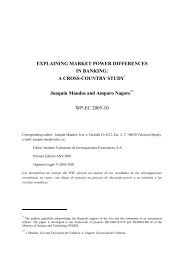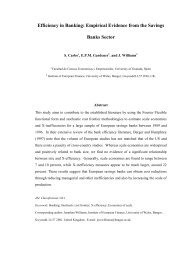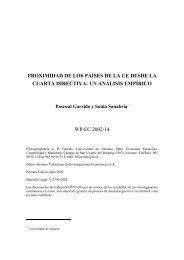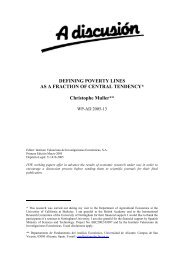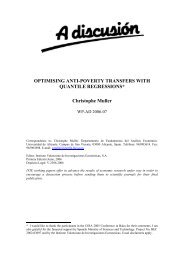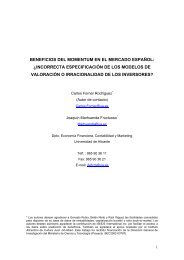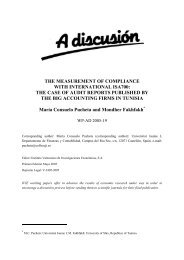Download PDF - Ivie
Create successful ePaper yourself
Turn your PDF publications into a flip-book with our unique Google optimized e-Paper software.
2 Econometric speci…cation<br />
Let D ijt be an unobservable continuous latent variable which measures mental problems.<br />
We also de…ne two dummies, E ijt and U ijt , one for being employed and another for being<br />
unemployed and interact each of them with the gender-speci…c unemployment rate in a<br />
region j at time t, UR jt . We then consider the following model to evaluate the e¤ect of<br />
economic conditions on mental problems:<br />
D ijt = t + Q t + R j + E ijt UR jt + U ijt UR jt + U ijt + X 0 ijt + u ijt (1)<br />
where t is a year-speci…c intercept, Q t is a quarter-speci…c intercept, R j is a region<br />
…xed-e¤ect. Terms E ijt UR jt and U ijt UR jt are the interactions of E ijt and U ijt with<br />
UR jt and state for the e¤ects of the regional unemployment rate for the employed and<br />
unemployed respectively. X ijt is a vector of personal characteristics of individual i living<br />
in the region j at time t, u ijt is a disturbance term.<br />
Economic conditions in‡uence employed people’s mental problems through . If a<br />
bad economic situation, i.e. a high regional unemployment rate, induces depression, <br />
should be positive, > 0. Well-being literature (Clark et al. 2009, 2010) emphasizes that<br />
employed people in times of high unemployment experience greater job insecurity due<br />
to more pessimistic expectations about their own employment opportunities or they may<br />
remain in unsatisfactory jobs that they would otherwise have likely left had labour market<br />
conditions been better. These circumstances might induce depression and anxiety. For<br />
example, Hartley et al. (1991), in their survey on job insecurity, found that depression<br />
increases proportionately to the level of job insecurity. Based on the National Alliance<br />
on Mental Illness Survey (2009), Roy-Bujnowski (2011) reports that employment in an<br />
uncertain economy is not always a protective factor against mental health problems. The<br />
employed could experienced involuntary changes in the employment, such as pay cuts or<br />
reduced hours. As a result, these individuals are likely to su¤er depression or some other<br />
form of a mental health problem.<br />
The situation is di¤erent for the unemployed. On the one hand, they could also be<br />
more depressed in bad times, as their chances of …nding a job lowers substantially. On<br />
the other hand, the social pressure on the unemployed is lower when there is greater<br />
unemployment. As Clark (2003) has suggested, unemployment may have less impact<br />
on the unemployed the more they see of it around them, as the stigma from their own<br />
unemployment is then reduced. One explanation could be that it is easier for the unemployed<br />
to establish social connections when others in the local area are also unemployed<br />
(Kessler et al. 1988). There could also be greater emotional support for the unemployed,<br />
as more people share the same economic situation. As Jackson and Warr (1987) suggest<br />
lower levels of psychological distress among unemployed from areas of chronically high<br />
unemployment compared to unemployed living in areas of low unemployment perhaps<br />
re‡ect better adaptation through networks, community solidarity and lower costs of living<br />
in areas with higher unemployment. Cohn (1978) …nds that the individual feel fells<br />
self-dissatis…ed to a smaller extent if she can attribute her change in employment status<br />
(becoming unemployed) due to some external cause, and the high level of regional unemployment<br />
might be such an external cause. Hence we expect the e¤ect for unemployed<br />
(), at least for some groups, to be smaller than , or even negative, < 0.<br />
Ideally, we would like to know which individuals became unemployed not as a result<br />
4<br />
6







